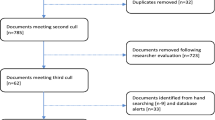Abstract
This article discusses the specific ethical dilemma of obtaining informed consent and ensuring confidentiality and participant well-being while conducting a qualitative research study with novice ESL teachers in a Teacher Study Group. The discussion outlines their process of resolution of the ambiguities inherent in the research process – in essence the researchers’ personal journey of discovery. The article concludes with the broader implications for making the research process more transparent for other academic researchers working in the field of language-teacher cognition.
Similar content being viewed by others
References
Burns, A. (1996). Starting all over again: From teaching adults to teaching beginners, In D. Freeman and J. C. Richards (Eds.), Teacher Learning in Language Teaching, Cambridge, MA: Cambridge University Press, pp. 154–177.
Clair, N. (1998). Teacher study groups: Persistent questions in a promising approach, TESOL Quarterly 32(3), 465–492.
Connelly, F. M. and Clandinin, D. J. (1988). Teachers as Curriculum Planners. Toronto, ON:OISE.
Crookes, G. and Arakaki, L. (1999). Teaching idea sources and work conditions in an ESL program, TESOL Journal 8(1), 15–19.
Dreyfus, H. L. and Dreyfus, S. E. (1986). Mind over Machine.New York: Free Press.
Eisner, E. W. (1991). The Enlightened Eye. New York: Macmillan.
Elbaz, F. (1991). Research on teachers’ knowledge: The evolution of a discourse, Journal of Curriculum Studies 23(1), 1–19.
Freeman, D. (2002). The hidden side of the work: Teacher knowledge and learning to teach, Language Teaching 35, 1–13.
Freeman, D. and Johnson, K. (1998). Reconceptualizing the knowledge base of language teacher education, TESOL Quarterly 32(3), 397–417.
Hall, E. (1959). The Silent Language. New York: Doubleday.
Johnson, B. (1997). Do EFL teachers have careers? TESOL Quarterly 31, 681–712.
Johnson, K. (1996). The vision versus the reality: The tensions of the TESOL practicum, In D. Freeman and J. C. Richards (Eds.), Teacher Learning in Language Teaching, New York: Cambridge University Press, pp. 30–40.
Kvale, S. (1996). Interviews: An Introduction to Qualitative Research Interviewing. Oaks, CA: Sage.
Lave, J. and Wenger, E. (1991). Situated Learning: Legitimate Peripheral Participation. New York: Cambridge University Press.
Richards, J. C. and Pennington, M. (1998). The first year of teaching, In J. C. Richards (Ed.), Beyond Training, Cambridge, MA: Cambridge University Press, pp. 173–190.
Author information
Authors and Affiliations
Corresponding author
Rights and permissions
About this article
Cite this article
Yeager-Woodhouse, D., Sivell, J. Prepackaged Tour Versus Personal Journey: The Meaning of Informed Consent in the Context of the Teacher-study Group. J Acad Ethics 4, 189–203 (2006). https://doi.org/10.1007/s10805-006-9027-z
Accepted:
Published:
Issue Date:
DOI: https://doi.org/10.1007/s10805-006-9027-z




